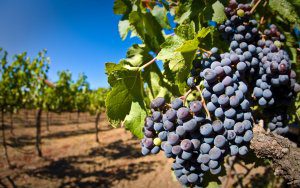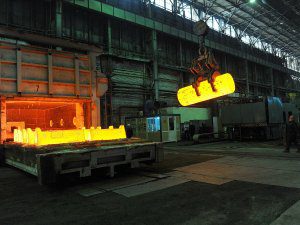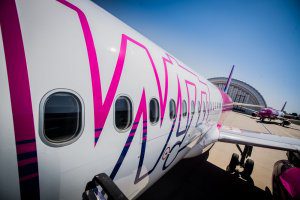
KYIV. Jan 20 (Interfax-Ukraine) – Ukraine in 2016 processed 253,860 tonnes of grapes for wine materials (excluding the temporarily occupied territory of the Autonomous Republic of Crimea and Sevastopol), which is 30.8% more than in 2015.
According to the State Statistics Service of Ukraine, companies of Mykolaiv region boosted grapes processing by 2.3 times, to 101,770 tonnes, Odesa region – by 6.4%, to 121,450 tonnes, and cut it in Kherson region by 10.6%, to 25,720 tonnes and Zakarpattia region – by 25.7%, to 4,920 tonnes.
Companies in 2016 increased production of wine materials by 18%, to 16.64 million decaliters (dal).
Production of wine materials in Mykolaiv region soared by 2.23 times, to 7,140 dal, while in Odesa region it fell by 13.2%, to 7,400 dal, Kherson region by 11%, to 1,760 dal and Zakarpattia region by 14.8%, to 340 dal.
Some 15.4% more wine materials for sparkling wine was made in 2016, 73% more for wine aging and production of table wine, and 0.7% less other types of wine materials.
Wine material for production of cognac fell by 35.1%, for fortified wine – by 45.4%, and 128,500 dal of spirit was used to fortify them (19.8% less than in 2015).

KYIV. Jan 19 (Interfax-Ukraine) – Japanese Ambassador Shigeki Sumi has said that Japan is ready to start the cooperation program with Ukraine to develop public broadcasting and supply technical equipment, the press service of Ukraine’s Information Policy Ministry reported on Thursday.
“After studying your address we have decided that Japan would provide technical equipment to develop public broadcasting in Ukraine,” Shigeki Sumi said at a meeting with Ukrainian Information Policy Minister Yuriy Stets on January 17.
The ambassador said that under the two and a half year program, starting this month, a group of experts would arrive to Ukraine from Japan. The group is ready to train public broadcasting specialists how to provide important information to citizens in the emergency situations. Japanese experts will also share experience of creating educational television programs with Ukrainian colleagues.
The ambassador also said that under a request of the ministry a possibility of launching the website of national information agency Ukrinform in Japanese has been found. This will be one of the ways to have access to information about Ukraine to Japanese.
Stets, in turn, said that the Information Policy Ministry will help to broadcast information about Japanese culture in Ukraine. 2017 year was announced the year of Japan in Ukraine.
“Ukrainians know a lot about assistance of the European Union and few about assistance of Japan. This is what we are ready to undertake – to promote spreading information about our friendly country Japan,” he said.
The ministry recalled that at the previous meeting of the minister and the ambassador the sides discussed Japan’s assistance in providing technical equipment for the multimedia platform of foreign broadcasting, but the sides decided to provide equipment to public broadcasting aiming at ensuring the efficiency of the reform.

KYIV. Jan 19 (Interfax-Ukraine) – Public joint-stock company Energomashspetsstal (Kramatorsk, Donetsk region), belonged to Russia’s Atomenergomash, will supply a large batch of ingots for Spain’s Euskal Forging, according to a posting on the company’s website.
The cost of the contract is not disclosed. The company will produce 36 ingots with a total weight of 1,039.6 tonnes.
Ingots will be used to produce products for various industrial sectors.
The products will be shipped in parts. The last batch of ingots is to be shipped in April 2017.
Energomashspetsstal is the largest Ukrainian producer of special cast and forged products for individual and small-scale production for metallurgy, shipbuilding, energy (wind, steam, hydro, nuclear) and general engineering. It has been part of the mechanical engineering division of Rosatom since 2010.

KYIV. Jan 19 (Interfax-Ukraine) – Hungary’s low cost airline Wizz Air resumes its operations in the Lviv International Airport and from April 2017 launches flights from Lviv to Wroclaw (Poland), Wizz Air Chief Corporate Officer Owain Jones has said.
“We officially inform that we start our operations in our second airport in Ukraine – Lviv. Starting from April 2017 we launch the new route from Lviv to Wroclaw,” he said at a press conference in Kyiv on Wednesday.
He said that Wizz Air will service the flights from Lviv to Wroclaw on Tuesdays and Saturdays. First tickets are appeared on the airline’s website. The prices start from UAH 619.
“Our clients will receive advantages travelling not only from Lviv to Wroclaw, but they can also use nine other destinations Wizz Air services in Wroclaw,” he said.
Jones said that in the near future the airline does not plan to resume operations of its subsidiary Wizz Air Ukraine. It will continue developing the base via Wizz Air Hungary.
He also said that the airline does not plan to resume operations in other Ukrainian airports.
He said that now Wizz Air offers 17 flights to eight countries in Ukraine. The recent destinations the airline launched were flights from Kyiv (Zhuliany) airport to Warsaw (Poland), Nurnberg (Germany) and Copenhagen (Denmark).

KYIV. Jan 19 (Interfax-Ukraine) – Ukraine has fully used EU tariff quotas on the deliveries to the European Union of corn, wheat, barley, sugar, poultry, honey, oats, grape and apple juice, malt and wheat gluten, processed tomatoes, barley groats and flour.
“In 2016 Ukraine fully used quotas on 11 groups of products. In 2015 it fully used quotas on eight groups of commodities (sugar by 99%), in 2014 six,” the Ukrainian Agribusiness Club (UAC) association said.
The main drivers of accelerating the closure of quotas were such groups: glucose and glucose syrup (from 6.1% of the used quota in 2015 to 58.7% in 2016), barley (from 77.7% in 2015 to 99.8% in 2016), malt and wheat gluten (from 72.9% in 2015 to 100% in 2016), poultry (an additional quota, from 22.5% in 2015 to 43% in 2016), bran (from 22.7% to 42.8%), starch (from 9.6% to 18.8%).
In 2016 Ukraine started using quotas for duty-free exports of processed dairy goods (24.4% of the quota used), processed cereals (2.7% of the quota) and mushrooms (0.1%). In particular, Ukraine started exporting milk powder (30%) and butter (46%).